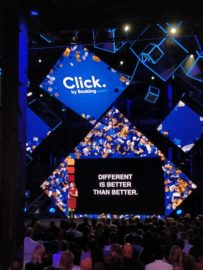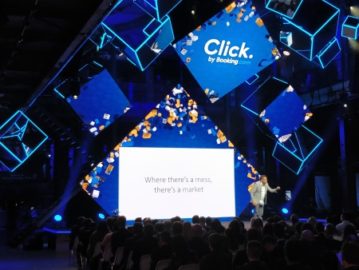
Home advantage – Amsterdam clicks for Booking.com event
By cameron in Uncategorized
This is a viewpoint by Simone Puorto
Click, the two-day event organized by Booking.com, was held in this year in SugarCity, a former sugar factory (hence the name) transformed into a stylish exhibition venue with a David Lynch-ian touch.
I still do not have the official numbers, but I counted at least 500 participants – partners, hoteliers, consultants and travel-tech companies.
Here’s my report.
Day One:
Messaging on steroids: chatbots and the rise of mobile
The first hour of the first day of the event is mainly an appetiser for the content to come and sets the tone for the day.
Pepijn Rijvers, Booking.com’s CMO, said:
“More guests are moving to mobile-only and mobile is creating a behavioral change: we became impatient and do not want to wait for our questions to be answered.
That is why we have a whole innovation center in Tel Aviv focusing exclusively on guest experience personalization via AI”.
According to Rijvers, 40% of Booking.com English customers’ questions are already answered, within minutes, by chatbot technology. “Today, guests expect answers in real-time, and we won’t be able to provide these answers without the help of machine learning and AI”.
Another subject that will return quite often during the day is the importance of the Chinese market and its innovations.
“To have an idea of how future will be like, we should turn to China…Chinese users use mobile as the entry point for everything, from banking to health to education, that is why messaging is becoming so important”.
We don’t search anymore, we tap around
How do users go online today? Booking.com explains that 50% of Alibaba turnover last year was generated through personalized promotions, while only a small volume came through search. But what does it mean for the industry? Rijvers explained:
“We spend hours online without ever ‘searching’…We tap around based on our friends’ posts, feeds and interest graphs. Problem is that what we do on the web today is very low-intent”.
“The answer is investing in personalization. Because, today, instant gratification is everything, and irrelevance is unacceptable”.
Removing friction and home regulation
After the opening session, three different panels took place.
Booking.com’s CEO, Gillian Tans, moved to the backstage for an engaging panel moderated by Amon Versteeg, director of partner marketing, probably my personal highlight of the day.
“Customer today spend more time planning than during the trip itself”, said Tans, highlighting (again) the friction still intrinsic to our industry.
When asked about rising regulations in OTA space, Tans is categorical: “We do favor regulation. Clear regulations, especially in the home-renting section, means having a fair and healthy competition”.
The panel ends with what’s boiling inside the company: from the sister brand Kayak’s acquisition of HotelsCombined to the increasing interest in transportations and tours. “We currently offer activities in 65 destinations and we are scaling with transportation. And there are a lot more different areas we are investing in”.
Fascination streets: different is better
Sally Hogshead is a New York Times bestselling author, with titles such as Fascinate: Your 7 Triggers to Persuasion and Captivation and How the World Sees You. She gave a one-hour passionate keynote about how to elevate the value of a brand by the use of fascination.
“Your brain wants to be fascinated and when it is, you are deeply engaged…When you speak, you’re either adding value or taking space…[In order to be successful] you don’t have to change who you are, just become MORE of who you are”.
Even though not directly related to travel, the theory is not that different from the concept of a unique selling proposition, and can easily be applied to travel. “You have one quality that is your primary advantage”, Hogshead says, that describes “how you are different, and what you do best”. “This”, she continues, “is the fastest and easiest way to describe your distinct value”.
The bottom line, explained through a series of examples, ranging from cities with unpronounceable names to online dating apps, is that “better is not necessarily better. Different, on the other hand, is.”
Waiting for David Coulthard
With too much caffeine running through our veins, many of us switch to anticipation mode. In this case, the anticipation is for David Coulthard, former Formula One racing driver, presenter, and journalist. I am able to sneak into the Booking Assistant Messaging platform presentation, hosted by Daan Brink (messaging product manager) and Ellora Nath ( ecommerce product manager). 40 minutes go by quickly in the beautiful, yet windy, Savannah room,
“AI is a baby, a dumb baby that is learning”, says Ellora.
I move back to the main stage. David Coulthard is there in a dark blue and grey suit, no tie, and a clear English accent. After admitting that he had the misfortune of competing in the wrong time (meaning: when Schumacher was competing as well…) he shared stories of his career and briefly spoke about how data reshaped Formula 1:
“The driver is still the heart of the rate, but engineers and mechanics have access to so much data today that they can see if something is going wrong before experienced pilots do”
Talking about the risks of racing, he ends with some inspiring words on trust:
“Life is dangerous and something is going to kill us in the end but, in racing, there is this beautiful bond of trust between drivers, mechanics, and engineers. Trust is essential: in competition, in business, and in friendship, isn’t it?”.
Day Two
Messaging on steriods, part two
The event opens in a similar tone to the previous day: the speakers of the day take the main stage offering bits and pieces of what their main sessions will be like, with AI and data analysis a recurring theme.
But technology, in our industry seems to be largely misunderstood: “Consumers don’t care about technology”, James Waters, VP customer service says, “they care about their personal problems. And if technology does not solve these problems, then technology is useless”.
The star of the introduction session is Rob Ransom, BookingSuite global director, with his three rules to create a really seamless guest experience:
“Get in the Cloud, Get Connected, Get Creative”
He expanded:
“You need a core system that is natively cloud-based. I am not only talking about Gmail, but your PMS, for example. You then need that system to be connected to all these new exciting innovations happening.
In the future, you will be able to connect to all systems with a single click, but we’re not there yet, so make sure to choose responsibly.
And, finally, creativity is up to you: How can you use this ecosystem to improve guest experience? That’s how you create a seamless guest experience”.
Ransom then introduced Erik Tengen, cofounder of upselling app Oaky. He speaks about how fragmented our industry still is and how much we need better and more open software integrations. “But things are changing with technology today, anyone can move from tech laggards to early adopters with very little investments,” he observed.
Revolutionising transportation – Hyperloop
The event continues with Nick Earle, chairman and CEO at Eseye and former SVP global field operations at Hyperloop One.
“Travel is bad and getting worse…Delayed flights, slow trains, and so on… In an 80 year lifespan, we spend four years trying to get to places. In emerging countries, it takes up to 6 years.”
So, where’s the solution? Earle fascinates the audience (including myself) by explaining how hyperloop technology works and how it could revolutionize transportation.
“By 2023 the technology will be available. It’s less than 5 years from now”.
Hyperloop travels at over 1,000 KM/hour and can move people from from Paris to Rome in little over an hour, according to its route estimator tool here:
“This is happening. This is not tomorrow, but neither was the internet. None of us knew what it was in the 90’s, and I was a Silicon Valley guy at the time…”
Where there’s a mess there’s a market
I was looking forward to Jonathan MacDonald’s speech. I’ve personally loved his book “Powered by Change”, so I may be biased, but his were easily the best 40 minutes of the whole event. Some of my favourite soundbites included:
“Disruption always starts with fundamental change. And fundamental change always starts with laughter. When Hon Lik knocked at Philip Morris’s doors with his e-cigarette idea, they laughed at him.”
“Success is defined on how well we change, while failure is due to our inability of changing”
“You can avoid reality but not the consequences of avoiding reality”
“ROI does not only stands for Return on Investment, but for Risk of Inaction as well. So, when you calculate your revenue, click-to-rate, room occupancy, etc., I want you to calculate also the risks involved with doing nothing”
The lesson to learn here is that our industry can be unpredictable and messy at times, but, to use his words: “where there’s a mess, there’s a market”.
He has made his presentation deck from the event available to download – click here.
Conclusions
I grab a vegan Tofu sushi (yummy) and move to a BookingPulse presentation. Elsewhere, sessions take place covering the growth mindset and content creation.
Parham Doustdar, a completely blind developer gives a motivational speech on how to improve guest experience for people with disability.
Daniel Houghton is the CEO of Pyxl, even though he’s probably better known as the former CEO of Lonely Planet. His speech covered how travel can change the World, shared his experience from Lonely Planet and meeting with Barack Obama, His observation on voice search distilled what many in the room and outside are thinking:
“We live in a world where we can ask Google, “Hey Google, I need to be in Amsterdam next Wednesday…” And you can be optimistic about this trend or you can be terrified”.
The takeaway of these two days is that the industry and the world it exists in is changing. And we should change with it.
This is a viewpoint by Simone Puorto
Opinions and views expressed by all guest contributors do not necessarily reflect those of tnooz, its writers, or its partners.
![]()



